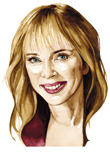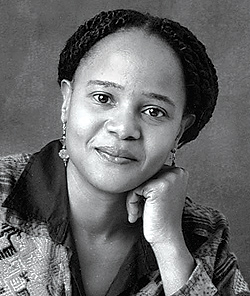 |
Eight years after her parents emigrated to the United States, 12-year-old Edwidge Danticat left Haiti—and the care of her aunt and uncle—to join them. But the turbulent and evocative island never left her: both Haiti and the experience of discovering a new country have permeated Danticat’s writing since her indelible début, 1994’s bestseller (and, later, an Oprah selection) Breath, Eyes, Memory, published when she was only 25. Krik? Krak! followed the next year, then The Farming of Bones (1998) and The Dew Breaker (2004)—all deeply moving and critically lauded. Now she has written Brother, I’m Dying, a searing family memoir that ricochets from Haiti to Brooklyn, and between Danticat’s father and beloved uncle, whose demise in U.S. immigration custody was the book’s catalyst. Victoria Lautman spoke by phone with Danticat, who lives in Miami.
 |
Q: Eight years without your parents—is that a gap that ever closes?
A: You don’t get everything back, no, but you just accept all those missing years, and I never knew the alternative. But for a long time I’d think in terms of my “real” age versus the age I’d be without my parents. I’m 38 now, but without my parents I’m 30.
Q: It’s appalling, what happens in this country to your uncle, your “second father.” Did you become, by the end of the book, an activist on his behalf?
A: Absolutely! I was pregnant when it was all happening, and was trying hard to control my rage. But a couple of weeks after he died I tried to get ahold of the documents and there was so much secrecy surrounding the incident. I just wanted to know what had happened to him! In the middle of all that, I thought, “These people have gotten themselves into a big fight, and I’m not going to move away from it.” There was such a lack of sensitivity at every step. And so this was the only way I could respond. It’s very important to me that what happened does not fall into silence. So yes, this book is part of my activism.
Q: Were you planning to write a memoir anyway?
A: No. And this isn’t really so much about my life as a book about my father, my uncle, and to a smaller extent my daughter, and how their lives all intersected. But there’s no other way to define it than as “memoir.” The way my uncle died reflected the sum of a lot of experiences of my family as immigrants in this country. That’s when I decided to write this.
Q: How hard was it to find your voice for this, versus your fiction voice?
A: It wasn’t so difficult. In a way it was like visiting with my uncle and father. When you’re writing fiction you need to find a place of motivation every day to convince yourself that it’s worthwhile. But with this, there was a constant flame under me, and I felt much closer to them. It was the easiest book I’ve written in a technical sense, and the hardest one emotionally. But I do feel that this was the book I was born to write, and everything before this was training.
Q: So many of your early stories were daughter-centric, long before you had a child. Now that you have a two-year-old, has it changed your writing?
A: I was listening to Krik? Krak! on audio recently—I can’t read my books; they make me cringe—but I was thinking of all the parts about daughters and childbirth and I thought, “My goodness! I got so many of those things right!” It just shows how universal the experiences are.


